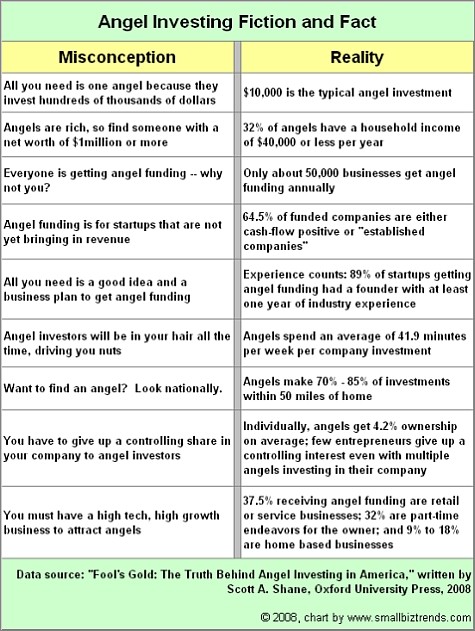Ten Tips to Appeal to Angel Investors
Post on: 27 Май, 2015 No Comment

- You should understand that private equity is a class of investment, and that most early stage entrepreneurs are better suited for investment from private investors (angels), then from professional venture capital partnerships. (top of page)
In the early 1980s, before federal laws allowed institutional pension funds to invest in venture-capital funds, venture capital looked more like angel capital does today. It was early-stage, high-risk capital. A typical venture capital fund might have had $4 million, and its managers would consider individual investments of $500,000 to $1.5 million.
In response to the influx of pension fund money, many venture capital funds have grown to a size of $100 million to $200 million. They are looking at sectors like information technology and health care for larger investments, in later-stage companies, that have the potential to generate $100 million in revenues.
The median venture capital deal today is about $7 million, and only 3600 early-stage companies received funding from approximately 500 venture capital funds in 1999, according to the National Venture Capital Association.
By contrast, according to the SBA, 250,000 or so angels in this country invest about $30 billion annually, most of it in seed, start-up and early stage ventures. The early-stage entrepreneur thus has an increased probability of raising funds from angel investors, then from professional venture capital partnerships.
It is very rarely that an entrepreneur raises capital from private investors without clearly defining the competitive landscape of his business and how his solution has a clear competitive advantage beyond others in the market. Investors will want to know the barriers to entry for your venture С namely, how you will keep competitors from being in the same exact business. Some barriers to entry might include: patents, trade secrets and proprietary technological development or solution.
In the investing world it is well known that good ideas are abundant and well-done execution is rare. As such, you recognize that an idea alone does not create success.
The existence of a prototype or working model of your business’ product or service can greatly increase your chances of attracting angel investors С the prototype phase of your business should be financed by yourself, friends, and family.
Angels are impressed when you have lined up potential customers who are willing to test or sample your product and also commit to purchase it, should it solve their problems.
An entrepreneur who can demonstrate that he can create paying customers in the real world is far ahead in terms of raising from angels than the entrepreneur who simply has a business plan and an idea.
If you have decided to raise capital for your venture, you will increase your chances for success if you hire professionals to assist you with the process. This requires budgeting for professional help, as well as the actual process of creating and mailing business plans, travel, telephone and FedEx.
It is unrealistic to assume that professionals will work only on a back-end success fee, getting paid only when you obtain funding, and that they will accept your stock in lieu of cash.
Early in the development of your business, your stock has no value and is illiquid. Professional advisors, who might be providing you with consulting, legal, accounting and investor introduction services, are paid for their professional efforts. They have businesses to run themselves, and those businesses require cash in order to provide you with the assistance you need. They should not be assumed to be partners in your venture С without the 50% stock ownership С who will assume your risk of success or failure.
If you have decided that angel investors are appropriate, try to focus on those who can help you. Angel investors will not have the financial resources to invest in all companies that approach them. Professional service firms and/or angel networks that work with private investors can assist you in the screening and selection process.
Angels have various investment criteria:
Deal size: Angel investors, being individuals, tend to know the investment size with which they are comfortable. The entrepreneur should not be surprised to find that most angels invest anywhere from $25,000 to $250,000, with a few occasionally beyond those levels. Thus, syndication of angels is a common process for those entrepreneurs, needing to raise capital, beyond the individual range of most angels.
Company stage: Some angels will only invest in seed or start-up companies, while others seek later stage ventures looking for expansion capital. The entrepreneur and their professional advisor should look to find those angels whom are well-suited to the stage of development of the venture.
Industry: Angels tend to invest in businesses they either know and/or can readily understand. Many angels, having previously been successful entrepreneurs, will tend to lean toward their prior industry experience.
A deal well-matched toward its prospective angel investors will have a higher probability of a successful closing.
A rule of thumb in the investing world is that a business is more likely to succeed if you at least have 1 or 2 parties experienced in the industry area you are pursuing, so that the skills of the angel investor become an adjunct to your team.
Unlike venture capitalists, angel investors do not give as much weight to whether you have been involved with successful startups before, or experienced successful venture capital deals before, or were a high-level executive of a large corporation during your career.
Angel investors want to see that you understand your industry and your business and have had some relevant experience. They are willing to invest in a person who has not been in a startup business before because, more often than not, they themselves were once startup entrepreneurs with no previous business experience.

A common question is: How long will it take me to raise money?
An appropriate answer is: Longer than you think.
Raising capital is a time-consuming process. It is not unusual for a startup entrepreneur to spend 50%-70% of his time raising capital from angel investors, a process that can last on average for 3-6 months.
During that time, angel investors will ask numerous detailed questions as part of their due diligence process and will raise objections in regard to your market, marketing strategy, technology, operations, or competitive landscape.
Your ability to clearly answer these questions and handle the objections will be crucial to your ability to raise capital.
Most angels see themselves as value-added investors, meaning that they derive as much personal satisfaction from helping a new business owner as they do from contributing capital to the venture. Many were previously successful business owners.
Angels bring with them value added benefits including: (1) prior industry experience (2) valuable knowledge about business itself (3) their ability to mentor (4) creative ideas (5) contacts for your business.
Value angels well beyond their financial contribution and will they will be even more likely to assist you in ways you had never imagined.
Raising capital is a marketing and selling process.
All good salespeople know that in order to make their numbers, they must have plenty of prospective customers in their sales funnel, as only a few will come out as real paying customers, when all is said and done.
Likewise, all good salespeople know that a customer is not really a customer until his check has cleared the bank.
Entrepreneurs who are raising capital should approach it as a marketing and selling process, whereby they work numerous qualified (3 to 4 times) the number of prospective investors they need to raise their round. Searching for additional prospective investors should never stop until all the required funding has been raised, and cleared, in the bank. Otherwise, the Entrepreneur will likely fall short of his capital raising goals.
If you want to start a business, be prepared to invest your own money.
Entrepreneurs who expect investors to risk their money in their venture, should also place at least 20% of their own net worth in their business. Those entrepreneurs who are not willing to assume such risk are not considered serious entrepreneurs by the investment community, and will most likely not receive any funding.














